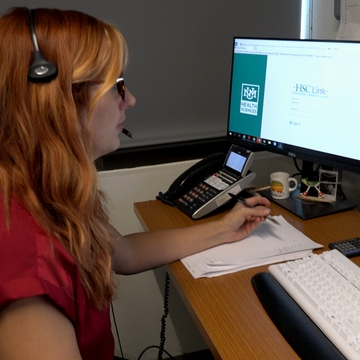Preparing for Disaster: UNM Hospital Participates in Region-Wide Emergency Training

Don't Know What to Do?
New Mexico Poison & Drug Information Center Has the Answers
Rattlesnake bites, exploding vape pen batteries, toxic pesticide exposure, poisonous mushrooms, unexpected drug interactions . . . for most of us, this would be a nightmarish list of calamities.
But they're all in a day's work for the specialists at the New Mexico Poison & Drug Information Center, says director Susan Smolinske, PharmD, professor of Pharmacy Practice and Administrative Sciences in the UNM College of Pharmacy
The 24/7 hotline, which fielded 21,000 calls last year, is the only one in the country manned by registered pharmacists, Smolinske says. They have to be prepared for almost anything.
Calls for help fall into several categories, Smolinske says. "Little kids are in the exploratory phase where they swallow things," she says, while older children tend to get into mischief. Adolescents may be actively exploring mind-altering substances or even threatening suicide.
Adults - especially older adults - "often are accidentally mixing drugs or experiencing drug interactions," she says. Pipeline workers and miners may face occupational exposures to dangerous substances.
And then there are the natural hazards - snakebite, spider bites, scorpion stings and poisonous plants. Rabid dog bites, West Nile virus and botulism crop up as well. And there are even occasional calls when pets or farm animals have a problem.
The center's 12 Certified Specialists in Poison Information (C-SPIs) are the only certified experts in medical toxicology in the state, Smolinske says. In fact, close to 30 percent of calls come from health care providers seeking their expertise, such as emergency room doctors and school nurses.
The center, which receives $2 million annually in state funding, along with additional federal money, is nationally accredited and even helps to train pharmacy students who serve month-long toxicology rotations there, Smolinske says. A health educator also offers outreach programs in the community.
The variety of challenges is what C-SPI Kyndall Monroe likes about her job. "I've always been a bit of an adrenaline junkie," she says, explaining that a stint at the Georgia poison control center in Atlanta while she was in pharmacy school sold her on the career.
With the start of the school year, children are resuming their ADHD medication, and Monroe says it's not unusual for one parent to administer a dose without realizing the other has already done so.
"They call us because they don't know what's going to happen," she says. "People think their child's going to die. We have to talk them off the ledge. I have to tell them I've handled these calls many times. I tell them, 'Your child's going to be perfectly fine. They're not going to have any sort of long-term damage.'"
Providing that reassurance can be one of the most important services provided by a poison control specialist. "The parents love us," Monroe says. "They're so sweet. We have parents crying all the time when they call us, and then by the end of it they're crying because they're so happy we helped them."
Sometimes, though, a call comes in too late to help someone. "Then, you're putting your feelings on the back burner, taking care of the patients as you can," she says. "That's the most stressful part of the job."
The C-SPIs usually spend a good part of their day checking up on earlier cases to make sure that patients are receiving the right kind of follow-up care. "A lot of our callers really appreciate it that someone cares enough to call them back," Monroe says.